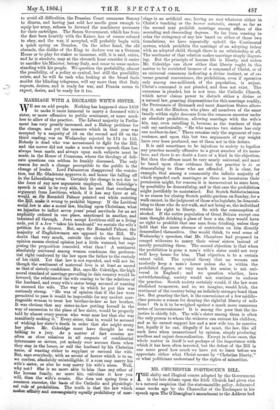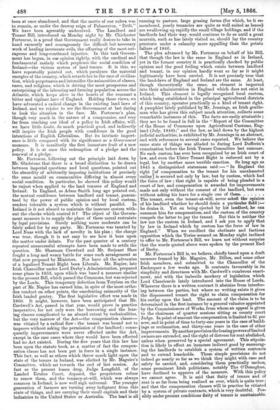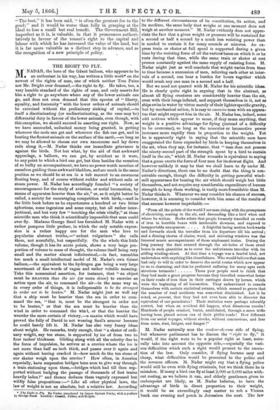Mil CHICHESTER FORTESCUE'S BTU,.
THE shiftyand illogical course adopted by the Government in the late debate upon the Irish Church had given rise to a natural suspicion that the statesmanlike policy, delineated some weeks ago by the Chancellor of the Exchequer in his speech upon The O'Donoghue's amendment to the Address had
been at once abandoned, and that the motto of our rulers was to remain, as under the drowsy reign of Palmerston, "Drift." We have been agreeably undeceived. The Landlord and Tenant Bill, introduced on Monday night by Mr. Chichester Fortescue, is a proof that Government really desires to take in hand earnestly and courageously the difficult but necessary work of healing inveterate evils, the offspring of the most out- rageous and long-continued injustice. In this task Govern- ment has begun, in our opinion rightly, with the cardinal and fundamental malady which perplexes the social condition of Ireland—the vicious system of land tenure. It is this, we have repeatedly pointed out, which paralyzes the material energies of the country, which retards her in the race of civiliza- tion, which perpetuates and intensifies the animosities of classes, races, and religions, which is driving the most prosperous and enterprising of the labouring and farming population across the Atlantic, which keeps alive in the hearts of the remnant a bitter and vigilant hate of England. Holding these views, we have advocated a radical change in the existing land laws of Ireland, and we rejoice to see the Government at last daring to look the situation in the face. Mr. Fortescue's plan, though very much in the nature of a compromise, and very far from reaching our ideal of a policy in Irish affairs, will, we have little doubt, do much practical good, and indirectly will inspire the Irish people with confidence in the good intentions of English Liberalism. But its intrinsic import- ance is little compared with its significance as a Government measure. It is manifestly the first immature fruit of a new policy. It is at once the redemption of a pledge and the renewal of a pledge.
Mr. Fortescue, following out the principle laid down by Mr.-Gladstone that there is a broad distinction to be drawn between imperial questions and local questions, pointed out the absurdity of arbitrarily imposing institutions of precisely the same mould on communities differing in almost every social condition. In particular, he showed this policy would be unjust when applied to the land tenures of England and Ireland. In England, as Adam Smith long ago pointed out, the mutual confidence between landlord and tenant, guaran- teed by the power of public opinion and by local custom, renders tolerable a system which is without parallel. In Ireland is it not absurd to maintain the insecure system with- out the checks which control it I The object of the Govern- ment measure is to supply the place of these moral restraints by legal provisions. Surely nothing more moderate can be fairly asked for by any party. Mr. Fortescue was taunted by Lord Naas with the lack of novelty in his plan ; the charge was true, though it is not easy to see how it bore upon the matter under debate. For the past quarter of a century repeated unsuccessful attempts have been made to settle_ the question. Mr. Sharman Crawford and Mr. Serjeant Shee fought a long and weary battle for some such arrangement as that now proposed by Ministers. Nor have all the advocates of a legalized Tenant Right been Liberals. Mr. Napier, late Irish Chancellor under Lord Derby's Administration, prepared some plans in 1853, upon which was based a measure similar to the present Bill, which passed the Commons, but was rejected by the Lords. This temporary defection from Toryism on the part of Mr. Napier has earned him, in spite of the most ortho- dox conduct on other points, the unrelenting animosity of the Irish landed gentry. The first legislative effort was made in 1860. It might, however, have been anticipated that Mr. Cardwell's Act, passed in that year, would prove in practice inoperative, for not only were the borrowing and the leas- ing clauses complicated to an absurd extent by technicalities, but the very marrow of the Act—the compensation clause— was vitiated by a radical flaw : the tenant was bound not to improve without asking the permission of the landlord ; conse- quently improvements were never effected under the Act, except in the rare cases where they would have been effected had no Act existed. During the five years that this law has been upon the statute book, as a matter of fact the compen- sation clause has not been put in force in a single instance. This fact, as well as others which throw much light upon the state of the tenure in Ireland, was elicited by Mr. Maguire's Committee, which sat towards the end of last session. As fast as the present leases drop, Judge Longfield, of the Landed Estates Court, deposed, the proprietors refuse to renew them, and the tenancy-at-will, which was always common in Ireland, is now well nigh universal. The younger generation of farmers are turning away indignant from this state of things, and are carrying their small capitals and their industries to the United States or Australia. The land is all
running to pasture, large grazing farms (for which, be it re- membered, yearly tenancies are quite as well suited as leases) are swallowing up rapidly the small tillage holdings, and if the landlords had their way, would continue to do so until a great murrain, such as has lately visited us, should lay the country prostrate under a calamity more appalling than the potato failure of 1846.
The plea advancel by Mr. Fortescue on behalf of his Bill, that though the law is the same in England as in Ireland, yet in the former country it is practically checked by public opinion and the good feeling which exists between landlord and tenant, in our opinion hardly went so far as it might legitimately have been carried. It is not precisely true that the land-laws of England and Ireland are the same. At least, though theoretically the same, an element is imported into their administration in England which does not exist in Ireland. This element is legally recognized local custom, which being established in the principal agricultural districts of this country, operates practically as a kind of tenant right. A pamphlet lately published by Mr. Jennings, an Irish gentle: man who has given this subject much attention, collects some remarkable instances of this. The facts are easily attainable ; they are to be found in full in the " Report of the Committee of the House of Commons upon Agricultural Customs, Eng- land (July, 1848) ;" and the law, as laid down by the highest judicial authorities, is exhibited by Mr. Jennings in an abstract, and with references to several cases reported. We believe the same state of things was alluded to during Lord Dufferin's examination before the Irish Tenure Committee last summer. No such custom has ever been recognized by an Irish court of law, and even the Ulster Tenant Right is enforced not by a legal, but by another more terrible sanction. So long ago as 1845 a distinguished statesman said :— " In England the right [of compensation to the tenant for his unexhausted outlay] is secured not only by law, but by custom, which had the force of law ; that right is capable of being pleaded in a court of law, and compensation is awarded for improvements made not only without the consent of the landlord, but even without asking his leave for a single one of them. .. . . . . The tenant, even the tenant-at-will, never asked the opinion of his landlord whether he should drain a particular field ;- he drains it. Yet on being ejected by his landlord, he can summon him for compensation, and the custom of the country compels the latter to pay the tenant. But this is neither the law nor the custom in Ireland, and I ask you to apply that by law in Ireland which by custom has the force of law in England." When we recollect the obstinate and factious opposition which the Tories 'seemed on Monday night inclined to offer to Mr. Fortescue's Bill, we learn not without surprise that the words quoted above were spoken by the present Earl of Derby. Mr. Fortescue's Bill is, we believe, chiefly based upon a draft measure framed by Mr. Maguire, Mr. Dillon, and some other Irish members, and submitted to the Chancellor of the Exchequer a few weeks ago. It contrasts favourably in its simplicity and directness with Mr. Cardwell's cumbrous enact- ment, and with the imbecile mockery of legislation which Lord Clanricarde lately introduced into the House of Lords. Wherever there is a written contract it abstains from interfer- ing between the parties, but where no writing exists it gives the dispossessed tenant the right to claim compensation for his outlay upon the land. The amount of the claim is to be determined in the first instance by a general valuator appointed by the Commissioners of Works, from whom an appeal is given to the chairman of quarter sessions sitting as county court Judge. In point of amount the compensation is limited to 61. per acre, and in point of time to forty-one years in the case of build- ings or reclamation, and thirty-one years in the case of other improvements. By another provision the leasing powers of limited owners are extended, and the right of distress for rent abolished, unless when preserved by a special agreement. This stipula- tion is likely to effect an immense indirect good by encourag- ing the landlords to establish a system of written contracts and to extend leaseholds. These simple provisions do not indeed go nearly so far as we think they might with ease and safety be carried, and, considering them practically useless, some prominent Irish politicians, notably The ('Donoghue, have declined to approve of the measure. With this policy we cannot agree. It is said that fixity of tenure and of rent is as far from being realized as ever, which is quite true ; and that the compensation clauses will in practice be vitiated by a system of private contracts, which is very doubtful. Pos- sibly under present conditions fixity of tenure is unattainable. " The best," it has been said, " is often the greatest foe to the good;" and it would be worse than folly in grasping at the ideal to lose a small but real benefit. The Government Bill, imperfect as it is, is valuable, in that it pronounces authori- tatively in favour of the tenant's right to the capital and labour with which he has increased the value of the land, but it is far more valuable as a distinct step in advance, and as the recognition of a new principle of policy.
































 Previous page
Previous page